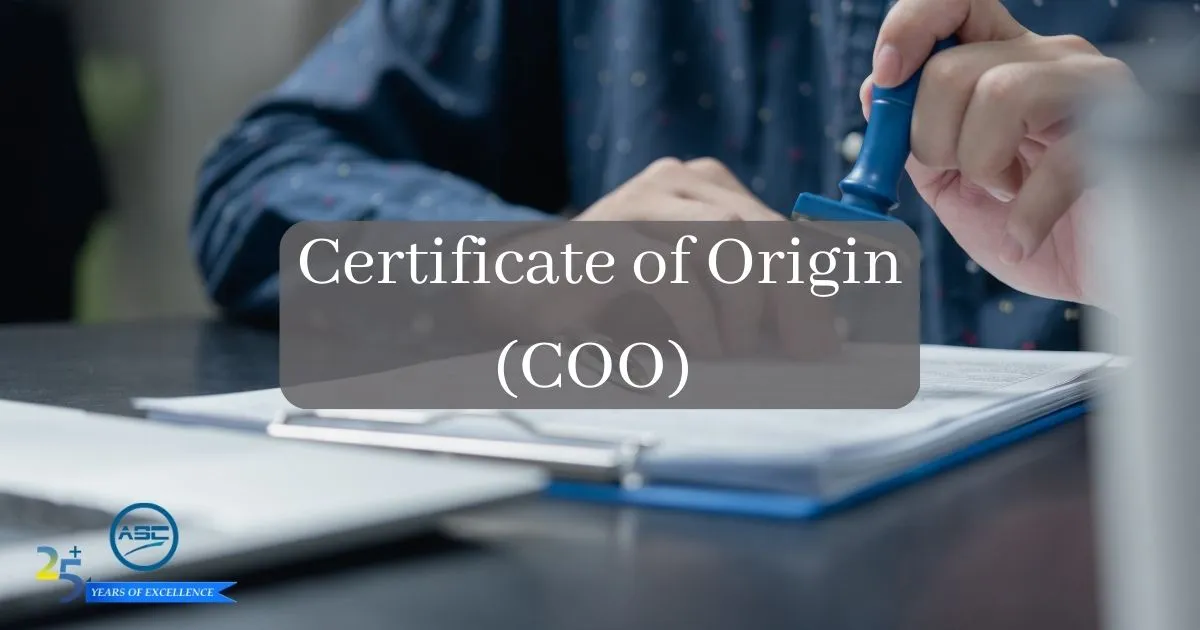Certificate of Origin (COO) in India – Meaning and Types of COO Certificate

Imports and exports in any country are chargeable to certain duties like customs, cess, anti-dumping duties etc. and a Certificate of Origin is important for such cases. One of the primary factors on which these duties depend is the country from which the goods are imported. However, it is always subject to manipulation. Let’s understand this with a simple example:
Suppose, a person in Mainland China is willing to export certain goods to India. However, these goods are subject to anti-dumping duty in India. To prevent the levy of anti-dumping duty, the exporter in China routes the export through Thailand considering that imports from Thailand to India are not subject to anti-dumping duty. This will not only benefit the concerned importers and exporters but will also cause revenue loss to the exchequer and injury to the domestic industry.
However, how can the revenue authorities ascertain from which country the goods are actually imported? This is where the Certificate of Origin plays an important role. What is a Certificate of Origin and what are its requirements? Let’s find out!
What is a Certificate of Origin?
As the name suggests Certificate of Origin helps in determining the actual origin of goods. It is a certificate that identifies the country where the goods were actually manufactured. It consists of information regarding the product, destination, and the countries where the goods are exported. It is one of the most important certificates in the case of cross-border trade.
Certificate of Origin in India is primarily issued by the Indian Chamber of Commerce as well as the Trade Promotion Council of India. These are primarily required by the exporters of India to prove that the goods exported by them are of Indian origin. Further, it proves that the goods that are exported are obtained, produced, and manufactured in India.
Why Certificate of Origin is Important?
The Certificate of Origin is important primarily for the purpose of customs clearance. If the goods to be exported or imported do not come with a Certificate of Origin for exports or import, then the customs officer does not permit clearance of goods from the warehouse. This is because it acts as an important instrument to determine the duties to be levied on such goods.
Types of Certificates of Origin
Primarily, there are two types of certificates of origin issued by the Chamber of Commerce. These include:
- Non-Preferential Certificate of Origin: This certificate of origin indicates that the goods that are being exported or imported are not eligible for any preferential tariff treatment. Thus, all the due duties shall be levied on such goods.
- Preferential Certificate of Origin: This certificate of origin indicates that the goods mentioned herewith are eligible for preferential tariff treatment. The preferential treatment can either involve concession in the duties or complete exemption from the tariffs.
Preferential arrangements/schemes under which India is receiving tariff preferences for its exports are:
- ICPTA – India Chile Preferential Trade Agreement
- SAFTA – South Asia Free Trade Agreement
- IJCEPA – India-Japan Comprehensive Economic Partnership Agreement
- SAPTA – SAARC Preferential Trade Agreement
- IKCEP – India Korea Comprehensive Economic Partnership Agreement
- AIFTA – ASEAN India Free Trade Agreement
- IMCECA – India Malaysia Comprehensive Economic Cooperation Agreement
- GSP – Generalized System of Preferences
- APTA – Asia Pacific Trade Agreement
- ISFTA – India Sri Lanka Free Trade Agreement
- GSTP – Global System of Trade Preferences
- Ind-Aus ECTA: India-Australia Economic Cooperation and Trade Agreement
- India-Mauritius Comprehensive Economic Operation and Partnership Agreement
- ISCECA – India Singapore Comprehensive Economic Cooperation Agreement
- India-UAE Comprehensive Economic Partnership Agreement
- India-Thailand Early Harvest Scheme
- India-Mercosur Preferential Trade Agreement
These Preferential arrangements/agreements prescribe Rules of Origin that have to be met for exports to be eligible for tariff preference.
Whether You Should Obtain a Certificate of Origin?
If you are an exporter and are willing to obtain the benefits of tariffs or any of the trade agreements that India has entered into, then the Certificate of Origin for exports will play a pivotal role in proving that the goods actually originated in India. Not obtaining a Certificate of Origin can lead to unnecessary hindrances in your international trade. You can reach out to ASC Group for obtaining a Certificate of Origin in India or any assistance in your international trade and compliance.

Leave a Reply